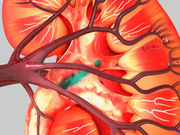AKI, albuminuria, eGFR considered separately or together can predict adverse outcomes in diabetes
TUESDAY, Nov. 10, 2015 (HealthDay News) — Three renal biomarkers, acute kidney injury (AKI), albuminuria, and low estimated glomerular filtration rate (eGFR), considered separately or together, can predict adverse outcomes in diabetes, according to a study published online Oct. 28 in Diabetes Care.
Mathilde Monseu, M.D., Ph.D., from the Université de Poitiers in France, and colleagues examined the prognostic value of AKI, albuminuria, and low eGFR considered together in patients with type 2 diabetes. A total of 1,371 patients were followed for a median of 69 months.
The researchers identified intrahospital AKI in 411 of the patients during follow-up. AKI correlated significantly with cardiovascular and noncardiovascular death, including cancer-related death in multivariate analyses. Major adverse cardiovascular events, heart failure requiring hospitalization, myocardial infarction, stroke, lower-limb amputation or revascularization, and carotid artery revascularization were predicted by AKI. Even when considered simultaneously in multivariate models, AKI, eGFR, and albuminuria predicted all-cause and cardiovascular death. All three renal biomarkers predicted most adverse outcome and renal failure risk.
“AKI, low eGFR, and elevated albuminuria, separately or together, are compelling biomarkers of major adverse outcomes and death in diabetes,” the authors write.
Copyright © 2015 HealthDay. All rights reserved.








